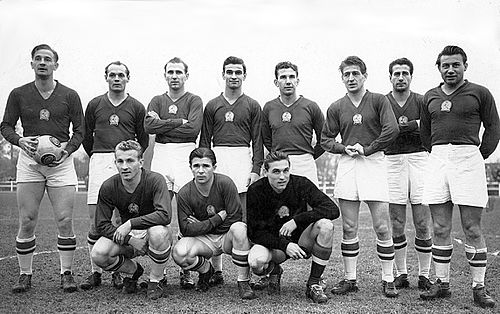This article has multiple issues. Please help improve it or discuss these issues on the talk page. (Learn how and when to remove these messages)
|

front row: Mihály Lantos, Ferenc Puskás, Gyula Grosics
back row: Gyula Lóránt, Jenő Buzánszky, Nándor Hidegkuti, Sándor Kocsis, József Zakariás, Zoltán Czibor, József Bozsik, László Budai
The Golden Team (Hungarian: Aranycsapat, pronounced [ˈɒrɒɲˈt͡ʃɒpɒt]) refers to the Hungary national football team of the 1950s. It is associated with several notable matches, including the quarter-final ("Battle of Berne") against Brazil, semi-final (against Uruguay) and final of the 1954 FIFA World Cup ("The Miracle of Bern"). The team inflicted notable defeats on then-footballing world powers Uruguay, Soviet Union, England, Germany, Brazil and Italy before the 1956 Hungarian Revolution caused the breakup of the side. The Golden Team was also known by different nicknames, such as the Mighty Magyars, the Magical Magyars, and the Magnificent Magyars.
| Medal record | ||
|---|---|---|
| Olympic Games | ||
| 1952 Helsinki | Team | |
| World Cup | ||
| 1954 Switzerland | Team | |
| Central European International Cup | ||
| 1948–53 Central Europe | Team | |
Between 1950 and 1956, the team played 69 games, recorded 58 victories, 10 draws and is generally considered to have suffered only one defeat, in the 1954 World Cup final against West Germany.[1] During this process they scored 436 goals.
Under the Elo rating system they achieved the highest rating recorded by a national side (2231 points, achieved on 30 June 1954). In 2016 the BBC listed the team as the best international football team ever in football history.[2]
The team is generally credited for successfully implementing an early form of "Total Football", later used effectively by the Dutch in the 1970s. The team is also generally recognized for introducing new, scientific coaching and tactical innovations, which were subsequently adopted throughout the game. The team's success became a subject of national pride in a period of oppression by the communist regime imposed on Hungary by the Soviet Union. In this period any "nationalistic" or even patriotic expression was strongly disapproved of, since these were considered being against the internationalist ideal of the communist government. In this atmosphere, international sport events were the only tolerated fields of expression of national pride.